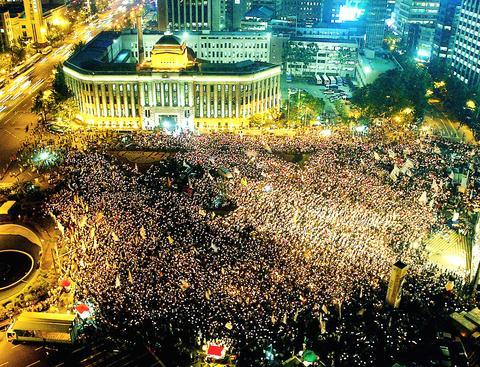The US, Japan and South Korea on Friday vowed they would crack down on alleged criminal activities by North Korea, including drug smuggling and money counterfeiting.
At a meeting in Hawaii, senior government officials of the three allies also urged Pyongyang not to inflame tensions over its suspected nuclear weapons program and vowed to seek a peaceful solution to the crisis.
The trio "expressed concern over the illegal activities by North Korean entities, including drug-running, counterfeiting and discussed means of co-operating among themselves and with other countries and international organizations to stop such activities," the communique said.

PHOTO: REUTERS
The calls came in a communique issued after a regular two-day meeting of the Trilateral Coordination and Oversight Group (TCOG) in Honolulu.
The reference to the illegal activities in the final statement was believed to be the first time such allegations have been committed to paper by TCOG, apparently indicating a firming of the allies' resolve in tackling Pyongyang.
The warning came as Japan and Australia beefed up inspections on North Korean ships suspected of trafficking drugs, counterfeit cash and missile parts, items that economically hobbled Pyongyang is thought to rely on for hard currency.
And on Thursday, five Japanese citizens were arrested in Tokyo on suspicion of illegally exporting jet-mill grinding machines, which can be used in making solid fuel for missiles, to Iran in 1999 and 2000.
North Korea has denounced Japan's decision to step up inspections of its ships, a move which has the strong backing of Washington which put Pyongyang on its "axis of evil" along with Iraq and Iran.
The officials in Hawaii also tackled the thorny issue of North Korea's nuclear program after it admitted publicly for the first time on Monday that it was seeking nuclear weapons to counter a US threat to its regime.
Washington, Tokyo and Seoul -- which have been at odds over how to handle the crisis -- also warned Pyongyang not to heighten international tensions over its nuclear program.
"The three delegations urged North Korea not to exacerbate the situation," the communique said.
"[The allies] agreed to continue to seek a complete, verifiable and irreversible end to North Korea's nuclear weapons program through peaceful, diplomatic means," the three nations said.
They stressed that North Korea's ties with them and the rest of the world "hinge on its taking prompt and verifiable action to end its nuclear weapons program fully and in a verifiable manner."
The meeting came amid lingering fears of a showdown after unpredictable Pyongyang announced last year it was restarting its frozen nuclear reactors that are capable of producing weapons-grade plutonium.
Since then, Washington has made efforts to nudge North Korea back to the negotiating table, while President George W. Bush and Japanese Prime Minister Junichiro Koizumi agreed last month to consider "tougher measures" against North Korea if it escalates its nuclear threat, a stance Seoul is not keen on.
The three powers in Hawaii also insisted at the meeting that South Korea and Japan take part in future multilateral talks over North Korea's nuclear program, despite Pyongyang's earlier objections to their presence.

A Chinese aircraft carrier group entered Japan’s economic waters over the weekend, before exiting to conduct drills involving fighter jets, the Japanese Ministry of Defense said yesterday. The Liaoning aircraft carrier, two missile destroyers and one fast combat supply ship sailed about 300km southwest of Japan’s easternmost island of Minamitori on Saturday, a ministry statement said. It was the first time a Chinese aircraft carrier had entered that part of Japan’s exclusive economic zone (EEZ), a ministry spokesman said. “We think the Chinese military is trying to improve its operational capability and ability to conduct operations in distant areas,” the spokesman said. China’s growing

Nine retired generals from Taiwan, Japan and the US have been invited to participate in a tabletop exercise hosted by the Taipei School of Economics and Political Science Foundation tomorrow and Wednesday that simulates a potential Chinese invasion of Taiwan in 2030, the foundation said yesterday. The five retired Taiwanese generals would include retired admiral Lee Hsi-min (李喜明), joined by retired US Navy admiral Michael Mullen and former chief of staff of the Japan Self-Defense Forces general Shigeru Iwasaki, it said. The simulation aims to offer strategic insights into regional security and peace in the Taiwan Strait, it added. Foundation chair Huang Huang-hsiung

PUBLIC WARNING: The two students had been tricked into going to Hong Kong for a ‘high-paying’ job, which sent them to a scam center in Cambodia Police warned the public not to trust job advertisements touting high pay abroad following the return of two college students over the weekend who had been trafficked and forced to work at a cyberscam center in Cambodia. The two victims, surnamed Lee (李), 18, and Lin (林), 19, were interviewed by police after landing in Taiwan on Saturday. Taichung’s Chingshui Police Precinct said in a statement yesterday that the two students are good friends, and Lin had suspended her studies after seeing the ad promising good pay to work in Hong Kong. Lee’s grandfather on Thursday reported to police that Lee had sent

A Chinese ship ran aground in stormy weather in shallow waters off a Philippines-controlled island in the disputed South China Sea, prompting Filipino forces to go on alert, Philippine military officials said yesterday. When Philippine forces assessed that the Chinese fishing vessel appeared to have run aground in the shallows east of Thitu Island (Jhongye Island, 中業島) on Saturday due to bad weather, Philippine military and coast guard personnel deployed to provide help, but later saw that the ship had been extricated, Philippine navy regional spokesperson Ellaine Rose Collado said. No other details were immediately available, including if there were injuries among